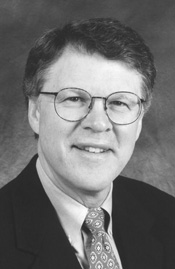 Peter B. Dervan was born on June 28, 1945 in Boston, Massachusetts. He received his BS degree from Boston College in 1967. Dervan began research in physical organic chemistry at Yale University and received his PhD degree in 1972. After a postdoctoral appointment at Stanford University, he joined the faculty at the California Institute of Technology in 1973 where he is now the Bren Professor of Chemistry in the Division of Chemistry and Chemical Engineering.
Peter B. Dervan was born on June 28, 1945 in Boston, Massachusetts. He received his BS degree from Boston College in 1967. Dervan began research in physical organic chemistry at Yale University and received his PhD degree in 1972. After a postdoctoral appointment at Stanford University, he joined the faculty at the California Institute of Technology in 1973 where he is now the Bren Professor of Chemistry in the Division of Chemistry and Chemical Engineering.
Peter Dervan has pioneered a field of bioorganic chemistry with studies directed toward understanding the chemical principles for the sequence specific recognition of the genetic material, DNA. Dervan and his co-workers have combined the art of synthesis, physical chemistry, and biology to create novel synthetic molecules with affinities and sequence specificities comparable to Nature's proteins for predetermined DNA sequences. This physical organic approach to DNA recognition underpins the design of cell-permeable molecules for the regulation of gene expression.
Dervan has received a number of scientific awards such as the Harrison Howe Award (1988), Arthur C. Cope Award (1993), Willard Gibbs Medal (1993), Nichols Medal (1994), Maison de la Chimie Foundation Prize (1996), Remsen Award (1998), Kirkwood Medal (1998), Alfred Bader Award (1999), Linus Pauling Medal (1999), Tolman Medal (1999), and the Tetrahedron Prize (2000). He is a member of the National Academy of Sciences, the American Academy of Arts & Sciences, the Institute of Medicine (NAS), and a Foreign Member of the French Academy of Sciences.
Dervan is considered an outstanding teacher having won several "excellence in teaching awards" from the Caltech undergraduates. He has mentored over 140 predoctoral and postdoctoral co-workers. In addition to teaching, research and administrative duties, he serves on several Scientific Advisory Boards for the pharmaceutical and biotechnology industries, as well as the Robert A. Welch
Foundation.